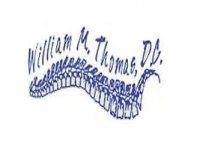I evaluate it by watching the gait of the jaw--opening and closing--observing any deviations and try to make it as symmetrical, smooth and uniform as possible. Clicking and popping, or jerking can because by tight pterygoid (medial and lateral) muscles, or adhesions in the jaw muscles, which will create deviations of the movement of the jaw. Clicking is not normally problematic, unless it causes pain, but may lead to pain. Try it yourself, look at yourself in a mirror, slowly open your mouth and watch for any ratchety motion, asymmetrical movement, clicking, or the position your jaw is in where it is painful. This is what we fix. Subscribe Here![]()
![]()
TMJ Dysfunction and Treatment
What? Chiropractors treat TMJD? It's not a spine, so... Yes, there is a process and a procedure for just about everything involving joints and biomechanical dysfunction/subluxation. I created this page because a patient came to me asking what he could do. His dentist wanted to fit him with a $600 night guard and asked my opinion. If you need a night guard, I'll give you my source, which is where chiropractors and dentists get them, and you don't need to go to your dentist or a prescription.
Like most musculoskeletal problems, I treat it with this formula.
1. Get you out of pain.
2. Stabilize the condition.
3. Maintain it.
The pain typically is caused by bruxism--grinding of the teeth, or injuries to the jaw, for instance, from an air bag deploying in a car accident. This can lead to abnormal movement, which will lead to wear on the teeth, possibly injury, and abnormal biomechanics of the jaw. If the problem is acute--fairly recent and painful--cold compresses to reduce inflammation would be used stabilize the area, as much of the pain is likely to be inflammatory. We want to minimize adhesions and scar tissue formation at a microscopic level as possible.
I may adjust the jaw, with my hands, or with an adjusting instrument. Sometimes I just mobilize it, work on the muscles outside and occasionally on the inside. Ultrasound and anti-inflammatory treatments would also be utilized to both stabilize as well as for pain relief. the goal is to restore normal motion.
WHAT I'M LOOKING FOR
If the condition does not stabilize, I would usually recommend a mouth guard, to prevent further irritation by teeth grinding. I used to refer to dentists to a have custom mouth guard made, but then I found their source, and prefer going to it. What a mouth guard does, is it prevents the jaw from moving abnormally, particularly when you sleep, so you can stabilize and maintain the problem.
Beat TMJ with custom night guards.
Newsletter
Monday, January 31, 2011
Chiropractic Treatment of TMJD
Our Home Page
Subscribe to:
Post Comments (Atom)

No comments:
Post a Comment